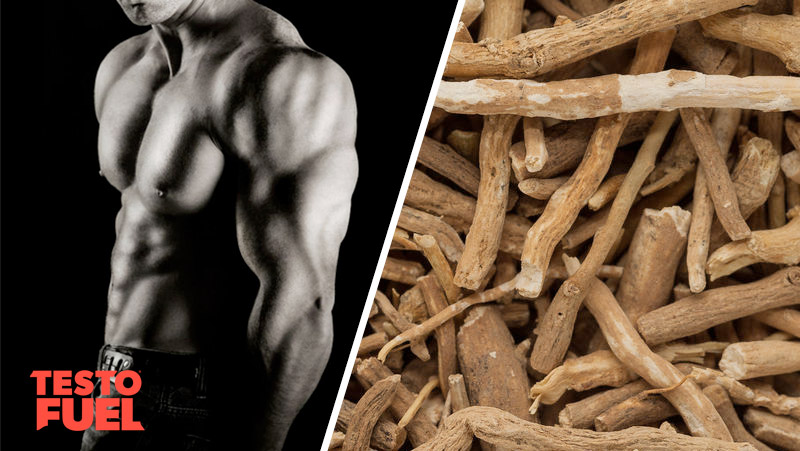TestoFuel Blog : Make Gains & Pack on the Muscle

Testosterone is the prime male hormone responsible for boosting strength virility and muscle mass.
The supplement industry is flooded with products promising to increase testosterone and muscle mass. Some work – the ones with tried and tested ingredients. Unfortunately others offer false hope based on poor quality research.
In this article we’ll take a look at an emerging supplement called ashwagandha and break down the research to tell you if it can really boost your testosterone levels.
Here’s what we’ll cover:
Withania somnifera, commonly known as ashwagandha, is a plant from the nightshade family. It is known by a number of different names including poison gooseberry, Indian ginseng and winter cherry.
It is a short, perennial shrub characterized by small, dark green leaves and a red fruit similar in shape and size to that of a berry or vine tomato.
The herb has been used as a general tonic in Ayurveda and indigenous medicine for over 3,000 years [1]. The literal meaning of ashwagandha translates to ‘smell of horse’ for two reasons – it is claimed to give you the strength and virility of the equine animal , and it also smells like one.
Withania is classed as an adaptogen – a natural chemical that allows you to cope with physical stress . It contains a number of alkaloids, a small number of fatty acids and also steroidal lactones – a possible therapeutic agent for cancer.
Withania – the most abundant lactone in the herb – is widely claimed to have potent aphrodisiac, rejuvenative and life prolonging properties. It is also traditionally used to promote stress relief, youthful vigor, endurance, strength, and health.
As we’ve seen, this herb has traditionally been used improve health and wellness, as well as to treat stress-related illness. There are a small number of studies that evidence this too.
A large cohort study by Auddy et al [2] randomly assigned a group of chronically stressed men and women to a Withania somnifera supplement or a placebo, over a 60-day period. They found that anxiety and well-being improved, and markers of health – including cholesterol decreased.
Withania has been seen to reduce cortisol – the body’s primary stress hormone – in participants suffering from chronic stress, by as much as 28%. It did so effectively, but the researchers themselves admitted the dose period of 300mg for 60 days was a ‘high concentration’ [3].
As a direct antagonist to testosterone, higher cortisol levels can be damaging to our T levels. But does this herb increase testosterone too, or just suppress cortisol? Let’s have a look at what the research says…
As with most adaptogens, there are studies around the general health benefits but not as much direct research on testosterone. Here’s a breakdown of the studies that do exist:
The common theme here with the research is that most studies involve men with reduced testosterone to the point of infertility.
For example, a study in the Journal of Ethnopharmacology [4], recruited 180 infertile men and gave them 5g of ashwagandha daily for 12 weeks. Sperm motility and quality improved, and the reduction seen in testosterone concentrations started to elevate. These results were echoed in a similar study using 60 Indian men. In this trial, T levels increased by ~14% and sperm quality improved, but again used infertile men as volunteers [5].
To date there is only one study available that has used healthy men as participants [6]. In this study, 57 young, healthy males underwent a weight training program over an 8-week duration. They were were given 600mg daily Withania root during the trial period too.
Compared to a placebo, the herb root group improved their strength and suffered less muscle damage. They also saw a modest increase in testosterone of 15%.
Testosterone may be increased in infertile men and also untrained men undergoing strength training, however there is currently no evidence to suggest an inherent testosterone boosting effect in otherwise normal men. This means that at present you need to take these results with caution.
Withania somnifera, commonly known as ashwagandha, is a plant from the nightshade family. It is a short perennial shrub characterized by small, dark green leaves and a red fruit similar in shape and size to that of a berry or vine tomato.
Withania is classed as an adaptogen in that it allows you to cope with physical stress . It contains a number of alkaloids, a small number of fatty acids and also steroidal lactones that may have potent aphrodisiac, rejuvenative and life prolonging properties. It is traditionally used to promote stress relief, youthful vigor, endurance, strength, and health.
Ashwagandha appears to boost T levels and sperm quality in infertile men, but at present there is only one study that has used healthy, but untrained participants – at present there is no research on those who are already weight training or undertaking physical activity on a regular basis.
This supplement may be more promising than other adaptogen herbs, but with the limited research on long-term safety and healthy individuals we would recommend using a more vigorously tested male support complex until future research is released.